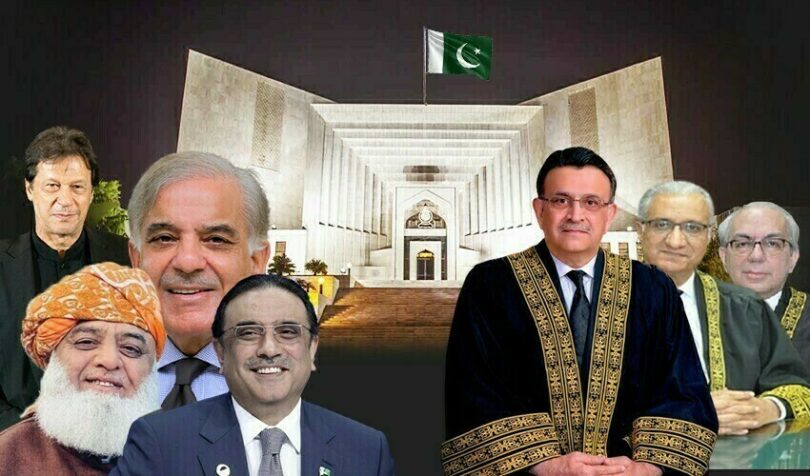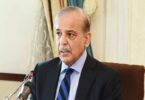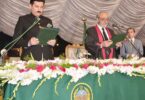ISLAMABAD (INP): Chief Justice of Pakistan (CJP) Umar Ata Bandial said on Friday that the Supreme Court would use the Constitution to implement its verdict of holding elections in Punjab on May 14 if the talks between the government and the PTI failed.
The top judge passed these remarks during the hearing of the petition seeking simultaneous elections across the country. A three-member bench headed by Chief Justice Umar Ata Bandial comprising Justice Ijaz Ul Ahsan and Justice Munib Akhtar heard the case At the outset of the hearing, Pakistan Peoples’ Party (PPP) lawyer Farooq Naek read out the report submitted over PTI-govt talks on the election date.
CJP Bandial emphasized the importance of political leadership in resolving political issues and also inquired about ongoing discussions with the International Monetary Fund (IMF) and asked if the budget was formulated under the guidelines of the IMF package. The Chief Justice noted that the court had already issued a verdict regarding holding polls within 90 days, and further stated that the court would not sit idle with the verdict for the May 14 polls if the parties involved failed to reach a resolution. He stressed that the matter in court was constitutional, not political and that the Supreme Court had left political matters to political parties.
Naek explained that without the assemblies, it would be impossible to approve the budget and that this crisis would not have arisen if the assemblies of Punjab and KP were not dissolved. The Chief Justice asked why the approval of the IMF agreement and trade policy were important, to which Naek replied: “Getting the IMF loan is key for the budget.” He added that the issue at hand would be resolved if an understanding was reached between the government and the opposition.
Justice Bandial also asked if the IMF loan would be used for reserves or the repayment of debts, to which Naek responded that only the finance minister could answer that question. The Chief Justice pointed out that even if the assemblies were dissolved, the Constitution gave a time period of six months for the budget. He also expressed concern that the issue was wasting a lot of the court’s time. CJP remarked court is not interested in the PTI-government dialogue, however, court has left the matter on the political parties. Farooq H Naik assured apex court that problems would be solved, on which, CJ replied, he only made tall claims.
In a petition submitted by a citizen named Sardar Kashif Khan, the federal government, the Election Commission of Pakistan (ECP), and key political parties have been named as respondents. The petition argues that holding the general elections of the National Assembly and all four provincial assemblies together would be in the interests of justice, equity, and fulfilling constitutional imperatives.
The petition further contends that holding simultaneous elections would ensure that they are carried out honestly, justly, fairly, and in accordance with the law. The caretaker setups that would be put in place for the elections would help to achieve this. According to the petition, having political governments in power in the provinces while general elections are being held for the National Assembly has the potential to adversely affect the National Assembly election more than in the inverse situation. This is because provincial governments have operational control of all day-to-day affairs in the respective National Assembly constituencies (other than those in Islamabad Capital Territory).
Moreover, holding elections simultaneously would save billions of rupees and the expenses could be included in the budget for the upcoming year. It would also require the armed forces and police only once instead of multiple times, allowing them to devote more time to their principal duties. This would free up law enforcement agencies to focus on improving the country’s law and order situation instead.
The petition also highlights that elections to the Punjab and Khyber Pakhtunkhwa (KP) assemblies would be held based on the results of the 2017 census while those to the National, Sindh, and Balochistan assemblies would be conducted on the latest census figures. The petition urges that such a situation should preferably be avoided as it could lead to unforeseen complications. In addition, the petition notes that the difference in the date previously ordered by the apex court for holding polls in Punjab and the one suggested by the government in October was “only a few months so there was no significant harm or delay.” It further suggests that the parliament could address the issues of delaying the Punjab and KP polls by passing a constitutional amendment.







